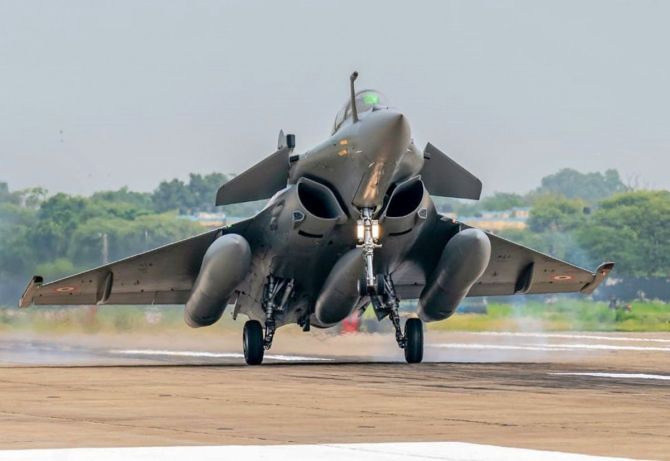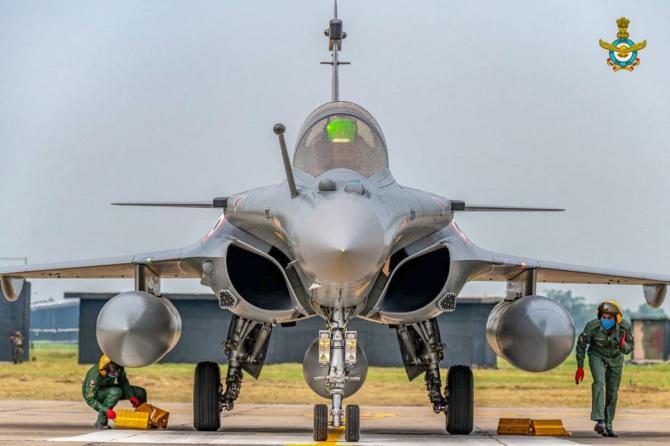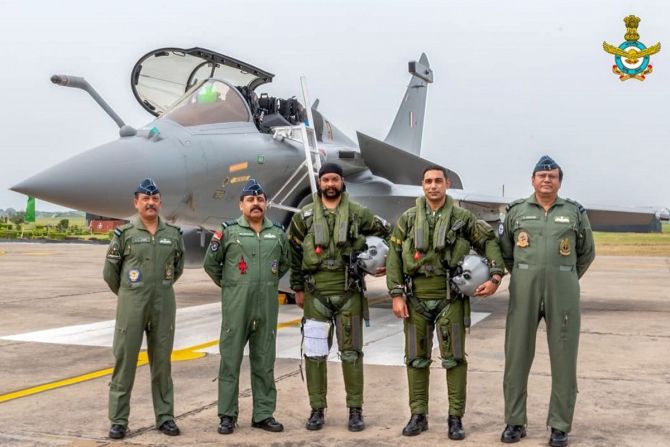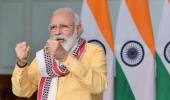India on Wednesday received its first batch of new multi-role fighter aircraft in two decades with the arrival of five Rafale jets, giving the country's air power a strategic edge in the midst of a bitter border row with China in eastern Ladakh and frayed ties with Pakistan.

The aircraft, having an undisputed track record and considered one of the most potent combat jets globally, landed at the Ambala Air Force base at around 3:10 pm to a rousing reception, nearly four years after India inked an inter-governmental agreement with France to procure 36 Rafales.
Each jet was given a special water cannon salute at the strategically-located air base in the presence of top brass of the Indian Air Force including Chief of Air Staff Air Chief Marshal Bhadauria who had played a key role as lead negotiator in procurement of the jets.
Welcoming the arrival of the jets, Prime Minister Narendra Modi, in a tweet in Sanskrit, said there is no virtue like protecting the nation and there is no vow like defence of the nation.
"The Birds have landed safely in Ambala," defence minister Rajnath Singh tweeted as soon as the aircraft touched down in Ambala.
At the same time, he used the occasion to send a veiled warning to China.
"I would like to add, if it is anyone who should be worried about or critical about this new capability of the Indian Air Force, it should be those who want to threaten our territorial integrity," the defence minister said.
Singh said that "the touch down of Rafale combat aircrafts in India marks the beginning of a new era in our military history. These multirole aircraft will revolutionise the capabilities of the IAF".

The fleet, which took off from Merignac airbase in French port city of Bordeaux on Monday morning, had a planned stopover at Al Dhafra airbase in the United Arab Emirates and began its onward journey on Wednesday morning.
The Rafale jets established contact with Indian Navy warship INS Kolkata in the Western Arabian Sea and were escorted by two Sukhoi 30 MKIs after they entered the Indian air space.
"The aircraft covered a distance of nearly 8,500 km from France to India. First stage of the flight covered a distance of 5,800 km in seven and a half hours. French Air Force tanker provided dedicated air-to-air refuelling support during the flight. The second stage of the flight covering over 2700 km was carried out with air-to-air refuelling by IAF tanker," the IAF said in a statement.
The National Democratic Alliance government had inked a Rs 59,000-crore deal on September 23, 2016 to procure 36 Rafale jets from French aerospace major Dassault Aviation after a nearly seven-year exercise to procure 126 Medium Multi-Role Combat Aircraft (MMRCA) for the Indian Air Force did not fructify during the UPA regime.
SEE: Water salute given to the five Rafale fighter aircraft
The emergency acquisition was made primarily to check the depleting combat capability of the IAF as the number of its fighter squadrons had come down to a worrying 31 against the authorised strength of at least 42.
The Rafale jets, known for air-superiority and precision strikes, are India's first major acquisition of fighter planes in 23 year after the Sukhoi jets were imported from Russia in 1997.
The Congress had alleged irregularities in the Rafale deal, claiming that the government was procuring each aircraft at a cost higher than what was finalised by the United Progressive Alliance government during negotiations for the 126 jets.
However, the government and aircraft manufacturer Dassault Aviation strongly refuted the allegations.

In a verdict in 2018, the Supreme Court had given clean chit to the government on the deal.
The political controversy relating to the deal peaked in the run up to the Lok Sabha polls last year.
"The Rafale jets were purchased when they fully met the operational requirements of the IAF. The baseless allegations against this procurement have already been answered and settled," the defence minister said.
The Congress on Wednesday welcomed the arrival of Rafale fighter jets, but again raised questions on issues of "delay" and cost.
SEE: Touchdown of Rafale fighter aircraft at Ambala airbase
The fleet, comprising three single seater and two twin seater aircraft, are being inducted into the IAF as part of its Ambala-based No 17 Squadron, also known as the 'Golden Arrows'.
The 'Golden Arrows' was resurrected on September 10 last year.
It was originally raised on Oct 1, 1951.
"A formal induction ceremony of Rafale aircraft in 17 Squadron is scheduled to be held in the second half of Aug 2020," the IAF said.

A government statement on Monday said 10 Rafale jets were delivered to India and that five of them are staying back in France for training missions.
The delivery of all 36 aircraft will be completed on schedule by the end of 2021, it added.
The aircraft is capable of carrying a range of potent weapons.
European missile maker MBDA's Meteor beyond visual range air-to-air missile, Scalp cruise missile and MICA weapons system will be the mainstay of the weapons package of the Rafale jets.
The IAF is also procuring new generation medium-range modular air-to-ground weapon system Hammer to integrate with the Rafale jets.

Hammer (Highly Agile Modular Munition Extended Range) is a precision-guided missile developed by French defence major Safran.
The missile was originally designed and manufactured for the French Air Force and Navy.
Meteor is the next generation of BVR air-to-air missile (BVRAAM) designed to revolutionise air-to-air combat.
The weapon has been developed by MBDA to combat common threats facing the United Kingdom, Germany, Italy, France, Spain and Sweden.
The Meteor is powered by a unique rocket-ramjet motor that gives it far more engine power for much longer than any other missile, said an official.
SEE: Rafale jets in Indian airspace, flanked by two Su-30MKIs
There will be a formal ceremony for the induction of the jets in mid-August.
Defence Minister Rajnath Singh and top military brass of the country are expected to attend the event.
The first Rafale jet was handed over to the IAF in October last year during a visit to France by the defence minister.
While the first squadron of the Rafale jets will be stationed at Ambala airbase, the second one will based at Hasimara base in West Bengal.
The Ambala base is considered one of the most strategically located bases of the IAF as the Indo-Pak border is around 220 km from it.

Ahead of the arrival of Rafales, authorities had imposed prohibitory orders near the Ambala Air Force Station and banned taking of pictures and videos ahead.
A large number of police personnel were also deployed in a three-kilometre radius.
The IAF has spent around Rs 400 crore to develop required infrastructure like shelters, hangars and maintenance facilities at the two bases.
Out of 36 Rafale jets, 30 will be fighter jets and six will be trainers.
The trainer jets will be twin-seater and they will have almost all the features of the fighter jets.

India began the process to buy a fleet of 126 Medium Multi-Role Combat Aircraft (MMRCA) in 2007 after the defence ministry, headed then by AK Antony, cleared the proposal from the IAF.
The contenders for the mega deal were Lockheed Martin's F-16s, Eurofighter Typhoon, Russia's MiG-35, Sweden's Gripen, Boeing's F/A-18s and Dassault Aviation's Rafale.
After a long-drawn process, bids were opened in December 2012 and Dassault Aviation emerged as L-1 (lowest bidder).
In the original proposal, 18 planes were to be manufactured in France and 108 in India in collaboration with the Hindustan Aeronautics Ltd.
There were lengthy negotiations between the then UPA government and Dassault on prices and transfer of technology.
The final negotiations continued till early 2014 but the deal could not go through.










